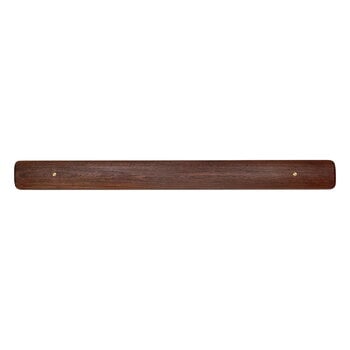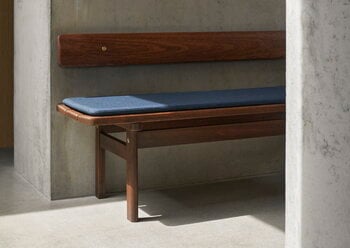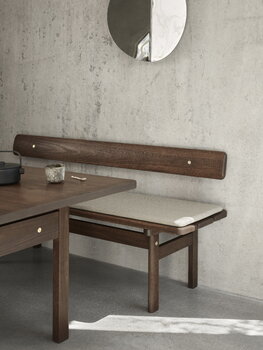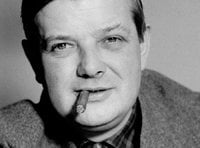This backrest is an add-on for Carl Hansen & Søn's Asserbo bench. The backrest is made of responsibly grown eucalyptus and has been awarded the EU Ecolabel, with brass screws adorning the dark-oiled wood surface.
BM0701 Asserbo backrest, 170 cm, dark oiled eucalyptus
Carl Hansen & Søn
Description
This backrest is an add-on for Carl Hansen & Søn's Asserbo bench. The backrest is made of responsibly grown eucalyptus and has been awarded the EU Ecolabel, with brass screws adorning the dark-oiled wood surface.
Product details (5)
- Colour
- Dark oiled eucalyptus
- Width
- 170 cm
- Depth
- 8.5 cm
- Height
- 15.5 cm
- Material
- Dark oiled eucalyptus
- Product ID
Designer
Danish furniture designer Børge Mogensen (1914 –1972) was one of the most influential designers of the Danish modern. Mogensen studied furniture design at Royal Danish Academy of Fine Arts, and his designs aimed at functionality, minimalist appearance and easy accessibility. Soon after his graduation Mogensen was named the chief of Danish Consumers’ Co-operative Society FDB, which focused on producing functional, durable and affordable furniture for all social classes.
Mogensen’s designs were often extremely modest and confident at the same time, and the same goes for his personality. Mogensen preferred to work with traditional and natural materials, but also liked to experiment with new techniques and supported the industrial production of furniture. His work was also influenced by folk art, lithography and Japanese wood carvings. During his career Mogensen was awarded with the Eckersberg Medal and C.F. Hansen Medal, and in 1972 he was named Honorary Royal Designer for Industry by the British Royal Society of Arts.
View all productsReviews (0)
Sustainability
The Product Sustainability Framework, our criteria of sustainable design, helps you find the most sustainable products in our selection. Read below which sustainability criteria this product has met.
Working conditions & labour 8/9
-
Equal opportunities for all employees
-
Commitment to UN Global Compact, fair compensation for all employees
-
Corporate responsibility requirements defined and communicated for suppliers
-
Systematic work for improved inclusion and well-being in the workplace
-
Transparent supply chain
-
Suppliers' compliance to a code of conduct ensured
-
Compliance to the UN Guiding Principles on Business and Human Rights ensured in the supply chain
-
Support for community involvement in the supply chain
-
Direct suppliers audited and certified
Eco-friendly production 7/9
-
Fair and resource-wise water-use in production
-
No incineration or landfilling of returned items
-
No use of endangered species as materials
-
No direct environmental emissions or waste (excl. GHGs) from production
-
The sustainability of direct suppliers' production is addressed and monitored
-
Material-efficient and ecological packaging
-
No potentially harmful chemicals used in own production
-
Production and material sourcing that respect biodiversity, animal rights, and natural ecosystems
-
Positive impact on nature’s well-being through operations that regenerate natural ecosystems
Climate impact 6/8
-
Company's direct greenhouse gas emissions identified and commitment to reduction
-
Product's carbon impact identified and commitment to reduction
-
Guidance on energy- and eco-efficient use of the product
-
Contribution to climate initiatives beyond the brand’s direct operations
-
Low-carbon or compensated transportation
-
100 % renewable energy in own production and operations
-
Carbon footprint of the product calculated and goals set to reduce it
-
Carbon neutral or carbon negative product
Sustainable materials 6/6
-
Sustainable and long-lasting material choices
-
No harmful or hazardous substances
-
Responsible raw material sourcing and production
-
Materials suited for circularity: monomaterials, recyclable finishings, renewable or recycled contents etc.
-
Ecological materials: natural, biodegradable, recyclable or recycled contents
-
Outstanding materials in terms of innovativeness, responsibility, sustainability and circularity: local production or sourcing, 100 % recycled content, C2C-certification etc.
Circular design 5/5
-
High aesthetic quality promoting long-term use of the product
-
Technically durable product design and material choices
-
Design for enduring life-long quality
-
Design and support for product maintenance, repair and upgradability
-
Innovative circular design solutions: circular service system, resale platform, remanufacturing, collection of used products, etc.









